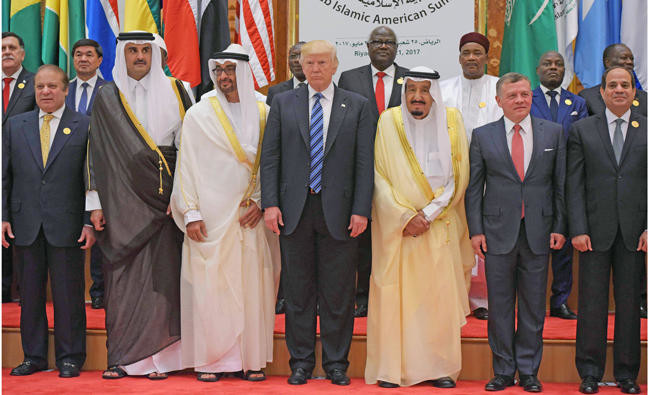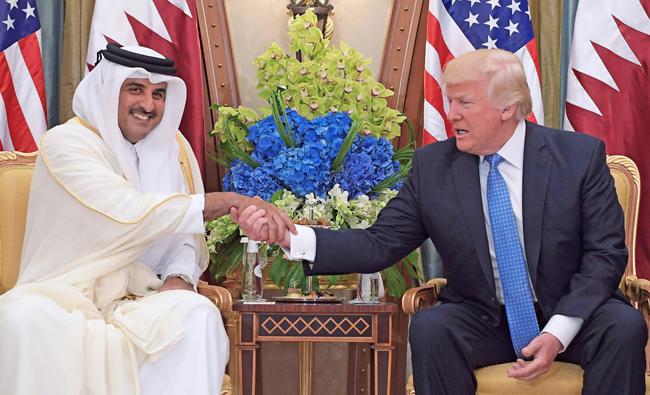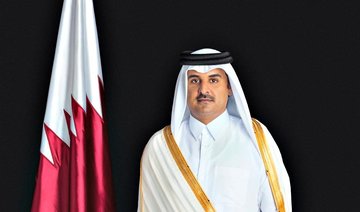JEDDAH: Tensions rose in the Gulf on Tuesday after a series of controversial comments attributed to Qatar’s emir, in a row that led to the blocking of Doha-aligned news websites in some neighboring states.
Sheikh Tamim bin Hamad Al-Thani’s alleged comments, carried by the official state news agency QNA, apparently saw him endorse Iran, Hamas and Hezbollah — strongly diverging from the stance of Qatar’s Gulf neighbors.
Doha claimed the report was the result of a hacking attack — but its Gulf neighbors responded nonetheless, particularly after the same comments were repeated in more than one language, on more than one outlet and at various times of the day in a manner which makes the story true and the hacking seem less likely.
The Arabic-language website and phone application of Al-Jazeera and the Middle East Eye website were blocked in Saudi Arabia and the UAE a day after the Qatari state news agency carried inflammatory comments attributed to Sheikh Tamim. Egypt also blocked some Qatari outlets, Al-Watan reported.
Earlier reports also attributed to the official Qatar News Agency said that Doha has withdrawn its ambassadors from Saudi Arabia, Egypt, Kuwait, Bahrain and the UAE, according to the Al Arabiya News Channel.
Qatar’s Foreign Minister said early Wednesday that he did not make any statement regarding the withdrawal or eviction of five Arab ambassadors from Doha, Al Arabiya reported.
Qatar maintains that the statement posted to QNA was the result of a hack, and says it is being investigated. But the report in question was simultaneously posted in different languages and on social media platforms, where they remained, according to Al Arabiya.
The remarks led to a widespread backlash on social media, while access to some Qatar-sponsored media outlets was restricted elsewhere in the Gulf.
The emir’s alleged comments were in line with recent criticism waged against the UAE, Bahrain and Saudi Arabia by other Qatar-sponsored media outlets such as Al-Jazeera, Al-Arab and the London-based Middle East Eye.
Sheikh Tamim also allegedly spoke of “tensions” with the new US administration and predicted that US President Donald Trump will not last long, citing domestic political problems in Washington over ties with Russia.
Sheikh Tamim also seems to have praised Iran, which even the previous US administration under President Obama labeled as the “biggest state sponsor of terror.”
The emir reportedly said: “There is no wisdom in harboring hostility toward Iran.”
Despite the emir allegedly saying that the relations with Israel are “good,” he went on to describe Hamas — which is designated as a terrorist organization by the US, EU and Israel and is condemned even by Arab countries for firing missiles toward civilians — as the “official representative of Palestinians.”
Despite this apparent endorsement of Hamas, the emir seems to have still refuted allegations of his country supporting terror. Yet many claim Doha supports both Lebanon’s Hezbollah and Egypt’s Muslim Brotherhood, which is designated a terrorist group by some fellow GCC countries.
The emir reportedly also criticized the UAE, Bahrain and Egypt for waging a campaign against Doha. All three countries are fierce critics of the Muslim Brotherhood. However, the emir seems to have not mentioned Saudi Arabia by name.
He did seem, however, to criticize what he described as “exaggerated” arms deals and said that countries should be spending such funds on development projects. That was an apparent attack on the recent enormous Saudi-US arms deals signed in Riyadh during President Trump’s visit.
The emir is said to have credited Al-Udeid Air Base, which houses the biggest US Air Force base in the region, with protecting Doha from some neighboring countries, without mentioning any names.
Whether the comments attributed to the emir are real or not, much of it reflects what was previously being reported by Qatari media outlets attacking Saudi Arabia, the UAE and Bahrain.
In a series of comments posted on his twitter account, Deputy Head of Dubai Police and General Security Dhahi Khalfan expressed his shock over the alleged statements.
In one tweet the Khalfan asked why Qatar would break the line of unity Riyadh has built, while in another he asked why Qatar would extend bridges with Iran.
Addressing Qatari citizens, Khalfan said: “You should not worry about Saudi Arabia, UAE, Bahrain, Kuwait and Egypt, you should be worried about Iran."
“Saudi Arabia succeeded in convincing the world of its stances but Qatar refused to listen,” the Dubai police chief added.
“What does Qatar mean that the US base is there to protect it from its neighbors? Qatari people are dear to their neighbors.”
Hack or attack? Qatari emir's allegedly contrarian 'comments' unsettle neighbors
Hack or attack? Qatari emir's allegedly contrarian 'comments' unsettle neighbors

Thousands worldwide benefit from KSrelief medical programs

- On Saturday, the organization also concluded its volunteer open-heart surgery and catheterization project in Dushanbe, Tajikistan
RIYADH: The Saudi aid agency KSrelief completed medical programs in Tajikistan, Turkiye, and Tanzania, in line with the organization’s aim to support injured people worldwide.
The Saudi Noor Campaign, which will conclude on May 6, is tackling blindness in Zanzibar, Tanzania.
The medical team examined 1,731 cases, assigned 198 prescription glasses, performed 60 operations and provided medication to 857 patients.
In Reyhanli district, Türkiye, KSrelief carried out a prosthetics and rehabilitation program.
With a team of 13 specialists, they fitted 36 individuals with prosthetics and 40 orthopedic splints.
On Saturday, the organization also concluded its volunteer open-heart surgery and catheterization project in Dushanbe, Tajikistan.
The team performed 133 open-heart catheterizations and 15 open-heart operations.
KSrelief continues humanitarian initiatives in Yemen and Syria

RIYADH: The Saudi aid agency KSrelief continues to launch volunteer programs throughout the Arab world to address humanitarian crises and improve the health of Yemeni and Syrian people.
In Damascus, the team completed three volunteer initiatives that supported hundreds with disaster response, administrative training, and psychosocial support for women and children. The program ran from April 26 to May 3.
In Yemen, meanwhile, KSrelief completed the first phase of an outreach vaccination campaign in the Aden governorate in collaboration with Yemen’s Minister of Public Health and Population Qasem Buhaibeh.
On Friday, the organization launched vocational training courses in Wadi Hadhramaut, Yemen, to improve the livelihood of locals and boost economic development.
The project targeted 1,500 people and focused on home appliance maintenance, carpentry, vehicle repair, men’s tailoring, beekeeping, plumbing, photography, and electricity and energy.
Saudi fashion event highlights retail trends, youth culture, and digital innovation

- Speakers noted that the increase in entertainment activities such as concerts and dining in the Kingdom in recent years has led to higher demand for fashion products because people are looking for ways to express themselves
RIYADH: A Riyadh fashion seminar on Sunday brought together industry leaders and creatives to explore the future of Saudi Arabia’s fashion economy.
Hosted by Chalhoub Group at Lakum Art Space, the event featured keynote presentations, panel discussions, and displays by 10 emerging Saudi designers from The Fashion Lab Cohort 2.

The agenda focused on three main themes: the evolution of fashion retail in the Kingdom; the role of cultural identity in building brands; and the rising importance of digital fashion and collaboration.
An awards ceremony honored the standout talents of this year’s cohort: APOA, Awaken, Bucketbox, Mona Al-Shebil, Noble & Fresh, Nora Al-Shaikh, Rebirth, Samar Nasraldin, The Untitled Project and USCITA.
FASTFACT
Hosted by Chalhoub Group at Lakum Art Space, the event featured keynote presentations, panel discussions, and displays by 10 emerging Saudi designers from The Fashion Lab Cohort 2.
One discussion explored consumer behavior in Saudi Arabia, revealing that the local market continues to grow despite global slowdowns.

Speakers noted that the increase in entertainment activities such as concerts and dining in the Kingdom in recent years has led to higher demand for fashion products because people are looking for ways to express themselves.
Retail experiences — both physical and digital — were emphasized as key to engaging Saudi consumers.

Youth culture, streetwear and sports are shaping brand narratives, a panel heard. Speakers discussed how fashion is being used as a tool for cultural storytelling, with an emphasis on grassroots creativity and community building.
Another topic highlighted the power of collaboration between local and international brands. Panelists discussed the importance of long-term partnerships, manufacturing localization, and mentorship to bridge gaps in knowledge and infrastructure.
Speakers also addressed the future of digital fashion, including virtual design, retail innovation, and new marketing strategies targeting Gen Z.
Saudi Arabia’s growing role in shaping the regional and global fashion economy was a prominent theme of the discussions.
First Saudi-Maldives forum to tackle transparency, governance in tourism

- Discussions aim to support sustainable development, promote safe tourism environment
RIYADH: Saudi Arabia — in partnership with the Maldives — is organizing the tourism sector’s inaugural Saudi-Maldives International Forum on Integrity, which is set to take place in the Maldives from May 6 to 7.
The forum is jointly organized by Saudi Arabia’s Oversight and Anti-Corruption Authority, and the Maldives’ Anti-Corruption Commission, in cooperation with the Organisation of Islamic Cooperation.
It will cover key topics such as enhancing transparency and governance in the tourism sector, combating corruption, and boosting international partnerships and expertise exchange among member states and regional and international organizations.
The discussions aim to support sustainable development and promote a trustworthy and safe tourism environment, the Saudi Press Agency reported.
The forum is expected to attract international participation from more than 40 countries and 10 regional and international organizations.
Attendees will include ministers, heads, and representatives of anti-corruption bodies from OIC member states, as well as key international organizations like the UN Office on Drugs and Crime, Interpol, the Global Operational Network of Anti-Corruption Law Enforcement Authorities, and the UN Development Programme. Local and international experts will also take part.
Organizing the forum reflects Saudi Arabia’s commitment to global efforts promoting transparency and accountability in tourism, according to the SPA.
The event highlights Saudi Arabia’s recognition of tourism as a key driver of sustainable development, in line with Vision 2030. It aims to build a thriving tourism sector, diversify national income sources, and stimulate economic growth.
Saudi deputy minister receives Pakistan’s ambassador

- They discussed bilateral relations as well as prominent developments in regional and international arenas
RIYADH: Saudi Deputy Minister for Foreign Affairs Waleed Elkhereiji received Pakistan’s Ambassador to the Kingdom Ahmed Farooq in Riyadh on Sunday.
During the meeting, they discussed bilateral relations as well as prominent developments in regional and international arenas, the Foreign Ministry wrote on X.
Meanwhile, Saudi Deputy Minister for International Multilateral Affairs Abdulrahman Al-Rassi received EU Ambassador to Saudi Arabia Christophe Varno in Riyadh.






















